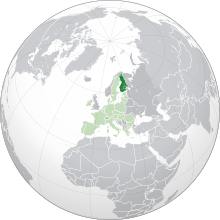This article needs additional citations for verification. (May 2024) |
 Finland (dark green) and its location in the European Union (light green) | |
| Total population | |
|---|---|
| 1,650[1] | |
| Regions with significant populations | |
| Helsinki (80% of the Finnish Jewish community), Turku (13%), Tampere (3%)[1] | |
| Languages | |
| Finnish, Swedish, Hebrew, Yiddish, German, Russian[2] | |
| Religion | |
| Judaism | |
| Related ethnic groups | |
| Ashkenazi Jews: notably Russian Jews, Ukrainian Jews, and others |
The history of the Jews in Finland goes back to the late 18th century. Many of the first Jews to arrive were nineteenth-century Russian soldiers (known as cantonists) who stayed in Finland after their military service ended.[1] The two synagogues in active use today in Finland were built by Jewish congregations in Helsinki and Turku in 1906 and 1912, respectively. The Vyborg Synagogue (built 1910–1911) was destroyed by Russian air bombings on 30 November 1939, the first day of the Winter War.[1] Today, Finland is home to around 1,800 Jews, of which 1,400 live in the Greater Helsinki area and 200 in Turku.[1] Finnish and Swedish are the most common mother tongues of Jews in Finland, and many also speak Yiddish, German, Russian or Hebrew.[2] Since data collection began in 2008, incidents of antisemitism have been on the rise in Finland.[3] The number of incidents are likely under-reported, as Finland does not have a systematic method for recording specific forms of hate speech that incite violence or hatred.[4]
- ^ a b c d e "Short History of Finnish Jewry". Jewish Community of Helsinki. Retrieved 5 November 2020.
- ^ a b Arnö, Kaj (2 November 2020). "About language and the Jews of Finland". Projekt Fredrika r.f. Retrieved 5 November 2020.
- ^ "Antisemitism: Overview of antisemitic incidents recorded in the European Union 2011–2021". European Union Agency for Fundamental Rights. 3 November 2022. Retrieved 1 October 2023.
- ^ "Fundamental Rights Report 2022, p. 87-88". European Union Agency for Fundamental Rights. 8 June 2022. Retrieved 1 October 2023.